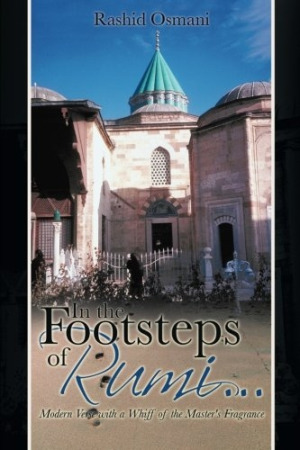
In the Footsteps of Rumi...
Modern Verse with a Whiff of the Master's Fragrance
Osmani’s collection takes inspiration from a great mystical poet and some of life’s hardships.
Sufi mystic Maulana Rumi is said to be the greatest mystical poet of all time. New poet Rashid Osmani has used Rumi’s influence, coupled with a near-fatal heart attack, to propel him from dabbling verse writer to serious poet. His new collection, In the Footsteps of Rumi…, includes ruminations on philosophical ideas, love, tragedy, life, and death. He does it all in a short and dense collection that utilizes a themed chapter-to-chapter structure, plus notes, prose portions, and even reader feedback.
Osmani’s verse is simple and uncluttered, from the first chapter, “Smile,” right through the other three, “Sigh,” “Nod,” and “Ponder.” There are no doggerel rhyming schemes, and specific poetry forms, like sonnets and ballads, are avoided. Word to word, theme to theme, the poems all exhibit a strong personal craftsmanship, notably exemplified in the piece “Checking Out”: “I start to sense loneliness / Gnawing at the heels of the freedom I’ve adored.”
The poet is also not afraid to be melancholy, darker in tone, or even pessimistic in some of his pieces. In his poem “Short Story,” Osmani sums up human existence with harsh imagery: “You and I— / Little lumps of flesh / Clinging to bones…Only to be lowered / Into other holes / To rot in leisure.” This striking lack of sentimentality is refreshing to read and yet reflective of the writer’s interest in conveying authentic human emotion through language.
Unfortunately, In the Footsteps of Rumi… includes too few poems. Osmani opts to create an almost experimental prose novelette rather than a straightforward poetry collection by including comments from past online poetry postings and chapter introductions that list the themes articulated in the pieces that follow. While stylistically interesting, this restricts what is really needed—the poems themselves—while including material that is not nearly as compelling as the poet’s verse. A better path to such an experimental work would include more direct references to Rumi’s actual ideas and poems, especially for those not previously familiar with his work. In the end, the added critiques and explanations—“You did an excellent job at articulating anxiety”—detract from the strength of the poems.
In the Footsteps of Rumi… shows a lot of promise from a rookie poet. There is clarity in each short poem and an overall lack of pretentiousness, something that often plagues new poets. Osmani seems to be looking to find the poetry that expresses the human condition, and he achieves this satisfactorily. Hopefully there will be more volumes and larger numbers of individual poems to enjoy in the near future.
Reviewed by
James Burt
Disclosure: This article is not an endorsement, but a review. The publisher of this book provided free copies of the book and paid a small fee to have their book reviewed by a professional reviewer. Foreword Reviews and Clarion Reviews make no guarantee that the publisher will receive a positive review. Foreword Magazine, Inc. is disclosing this in accordance with the Federal Trade Commission’s 16 CFR, Part 255.
